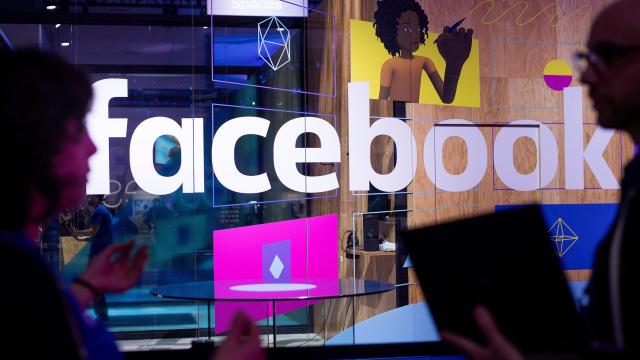Last year, a Google engineer named James Damore triggered an entirely unnecessary and ultimately unproductive controversy after his internally published earn himself some cred on in the right-wing media circuit.
U.S. conservatives have only grown angrier about supposed bias at tech companies in the meantime, with the president himself increasingly grousing about thinly-sourced allegations of censorship and rigged search results. Now it looks like a senior engineer at Facebook has decided to do take a page from Damore’s playbook, per the New York Times, posting a complaint to an internal company message board titled “We Have a Problem With Political Diversity.” Said engineer, self-described Objectivist and car-detailing enthusiast Brian Amerige, has also created a discussion group to promote the letter’s message.
The Times wrote:
“We are a political monoculture that’s intolerant of different views,” Brian Amerige, a senior Facebook engineer, wrote in the post, which was obtained by The New York Times. “We claim to welcome all perspectives, but are quick to attack — often in mobs — anyone who presents a view that appears to be in opposition to left-leaning ideology.”
Since the post went up, more than 100 Facebook employees have joined Mr Amerige to form an online group called FB’ers for Political Diversity, according to two people who viewed the group’s page and who were not authorised to speak publicly. The aim of the initiative, according to Mr Amerige’s memo, is to create a space for ideological diversity within the company.
(One of the Times writers co-bylined on the piece, Kate Conger, formerly worked for Gizmodo, where she originally broke the Damore story.)
In the full text of the message obtained by the Times, Amerige alluded to a number of complaints about Facebook’s alleged “political monoculture” and a mob mentality against “anyone who presents a view that appears to be in opposition to left-leaning ideology.”
Amerige’s complaints ranged from unspecified individuals tearing down “posters welcoming Trump supporters” to overheard criticism of right-wing individuals involved with the platform, like Oculus VR founder Palmer Lucky and board member Peter Thiel. (Thiel secretly funded a lawsuit that led to the bankruptcy of Gizmodo’s former owner Gawker Media.) They also included allegations employees had been fired over their support of the conservative “All Lives Matter” catchphrase, as well as Amerige’s claim he had been called a “transphobe” for calling “out our corporate art for being politically radical.”
There’s also a lot of scare quotes around terms like “social justice,” “diversity,” “equality,” and “offensive,” suggesting that having the temerity to say the wrong things about these sensitive issues at Facebook can be costly to one’s “reputation and career”:
Your colleagues are afraid because they know that they — not their ideas — will be attacked. They know that all the talk of “openness to different perspectives” does not apply to causes of “social justice,” immigration, “diversity”, and “equality.” On this issues, you can either keep quiet or sacrifice your reputation and career.
These are not fears without cause. Because we tear down posters welcoming Trump supporters. We regularly propose removing Thiel from our board because he supported Trump. We’re quick to suggest firing people who turn out to be misunderstood, and even quicker to conclude our colleagues are bigots. We have made “All Lives Matter” a fireable offence. We put Palmer Luckey through a witch hunt because he paid for anti-Hillary ads. We write each other ad-hoc feedback in the PSC tool for having “offensive” ideas. We ask HR to investigate those who dare to criticise Islam’s human rights record for creating a “non-inclusive environment.” And they called me a transphobe when I called out our corporate art for being politically radical.
Amerige’s message does not include any falsifiable accusations of Facebook censorship of conservative users, beyond questioning whether the company’s supposed internal bias means it can still be “entrusted by a great part of the world to be impartial and transparent carriers of people’s stories, ideas, and commentary.” It does, however, go on to cite the president’s view that Facebook is somehow being unfair to conservatives:
Congress doesn’t think we can do this. The President doesn’t think we can do this. And like them or not, we deserve that criticism. We are blind to and dismissive of what people beyond our walls (let alone even within our walls) think about complex issues that matter. I’ve been here for nearly 6.5 years and this has gotten exponentially worse in the last 2.
Amerige’s letter encourages employees to debate politics in the group, the Times wrote, which has already resulted in some Facebook staff reporting discussions there as offensive to minorities. (Another employee told the paper they appeared to be constructive and inclusive.)
There’s next to no evidence that Facebook is actively censoring conservative users—in fact, everything suggests that for the past few years the site has been absolutely terrified of angering them and thus triggering backlash from their allies in government. And as far as claims of internal censorship go, Amerige’s concerns appear to mirror Damore’s in that their primary gripe is that a small minority of people who choose to express “offensive” views in the workplace face social or professional consequences. In other words, it appropriates the language of civil rights to push what essentially amounts to a personal political grievance in the workplace. Freedom of speech is not freedom from consequences, especially in the private sector.
In any case, Amerige’s letter seems almost deliberately constructed to draw the attention of the conservative media and perhaps the president himself. So buckle up, because this is probably not gonna end anytime soon.
Gizmodo reached out to Amerige for clarification on certain parts of his letter, and we’ll update this post or write a followup if we hear back.
